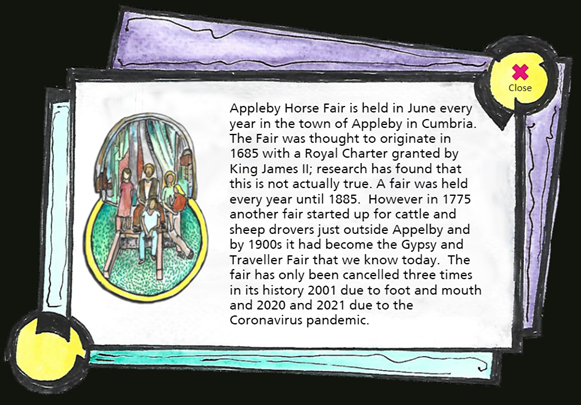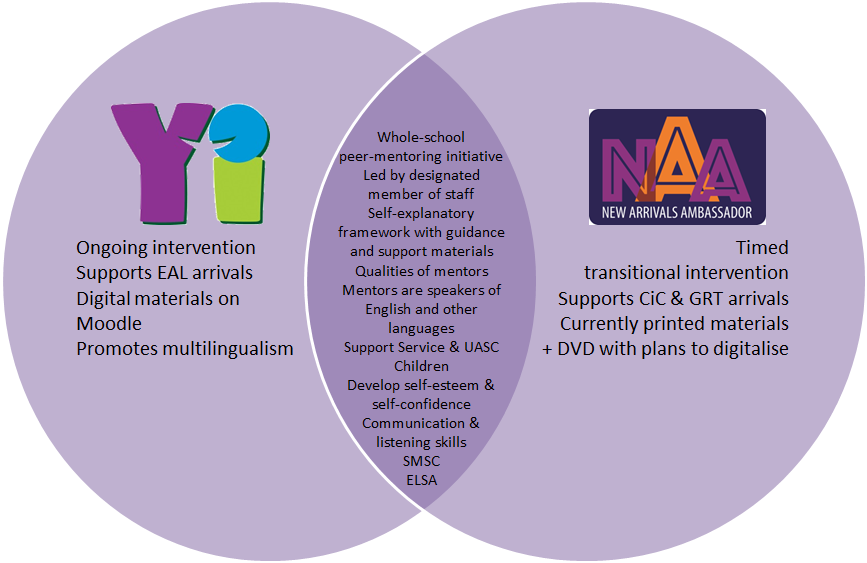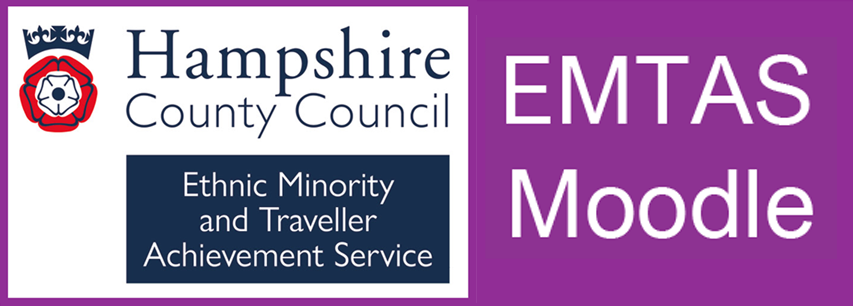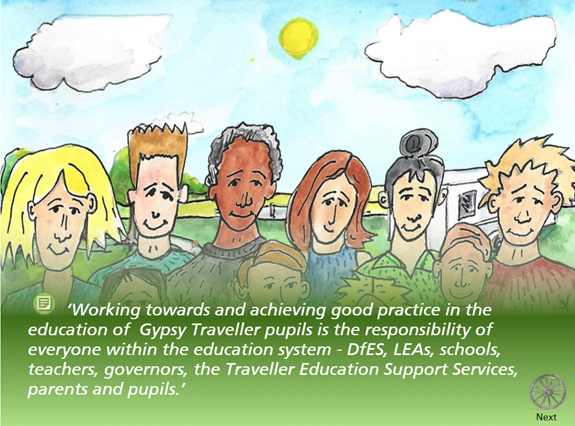Site blog
By Steve Clark, Hampshire EMTAS Teaching Assistant for Travellers
Hampshire EMTAS is pleased to announce the release of a new e-learning module for all school staff who support children and families from GRT backgrounds. This module - which complements existing EMTAS cultural awareness training - aims to offer CPD in a way, and at a time, which fits in with practitioners’ busy work schedules. It offers an insight, through self-driven exploration, into the linguistic and cultural aspects of several GRT backgrounds. There are phase-specific examples of how best to support children and families from GRT heritages and an opportunity to build an action plan to support your work with your GRT communities.
So what does it look like?
The GRT e-learning course takes approximately 40 minutes to complete. The objective is to provide a general awareness of several GRT cultural groups, their languages, their history and from where these groups originated. It is designed to enable the learner to explore various aspects to the support offered by a school to its GRT pupils and their families.
Who should take this course?
This unit will be relevant for class teachers, Governors, TAs/LSAs, the GRT coordinator and any home-school link workers. It is particularly relevant for any trainee teachers and those at an early stage in their teaching career. It is also a useful addition to the training programme of any agency that supports children and families from GRT backgrounds, whether they are within or outside of Hampshire.
What does it include?

Find out interesting facts about GRT cultures around the
world and listen to four podcasts about Roma, Irish Travellers, English Gypsies
and Showmen. In addition, you can have a try at a language activity which will
introduce you to Romany. There are interactive school maps where you can access
phase specific information about catering for GRT families. You can learn more
about the benefit of ascription for GRT pupils, their families and the school
and there is helpful advice about attendance issues, dual registration,
distance learning and how and when to use the ‘T’ Code appropriately. The unit
culminates with the creation of an action plan to support your role as GRT Lead.
How can I access this module?
This module is available free of charge to Hampshire LEA schools and Academies that have bought into the Hampshire EMTAS SLA. There is a charge for other institutions to access the unit. Please contact emtas@hants.gov.uk for details.
Where can I find out more about GRT?
Visit our website and use the tabs to find out more about GRT resources, how to access support for a Traveller child, effective distance learning for GRT pupils, the GRT Excellence Award and Kushti Careers
Guidance for schools regarding attendance
A Study Into the Use of the T Code
Find out more about our suite of e-learning
modules, including The Culturally Inclusive School
By the Hampshire EMTAS Traveller Team
Due to current circumstances and the impact on schools of the lockdown, we have decided it would be a good idea to move our celebration of Gypsy, Roma, Traveller History Month (GRTHM) from its traditional month of June to October so no one will miss out on our planned events.
To this end, we are putting on three roadshows across the county. The roadshows will be in Basingstoke, Winchester and the New Forest and there will be something for everyone from talks to exhibitions to Stepping with FolkActive. The roadshows promise to be lively, entertaining and informative and will give our audiences a chance to see how Hampshire EMTAS works with its schools and GRT communities.
The roadshows are drop-in events with talks taking place between 4pm and 5pm after which people will be invited to take part in a stepping activity. Stepping is a traditional form of dance that was initially a type of sport for working class men in the north of England and for Travellers. Each dance is created by the individual dancer and does not follow any set rules – it is energetic and is often described as tapping or drumming with your feet. It requires no previous experience or expertise and when the live music is playing, it is impossible not to move your feet. Come along and join in.
There will also be an exhibition of the Life of Showmen displaying the rich history of Showmen in Hampshire through the decades and a display of all the entries to the a postcard competition (details below).
These promise to be lively events with lots of interaction, music and dance so save the date! The EMTAS Gypsy Roma Traveller History Month Roadshows will take place on:
1st October: The Discovery Centre, Winchester, 3.30 – 6.00pm
8th October: The Discovery Centre, Basingstoke, 3.30 – 6.00pm
22nd October: Applemore College, Hythe, 3.30 – 6.00pm
We hope lots of you will be able to attend a roadshow near you. We will soon be sending out a Schools Comm with further details and we’ll be advertising the roadshows on our website as well as issuing personal invitations to all the schools, families and agencies we work with. We look forward to welcoming you to one of these events and to getting to know you while you enjoy the exhibitions, talks and dancing. We hope to see you there!
The EMTAS GRTHM
postcard competition
As part of our GRTHM celebrations, we are also holding a postcard competition. It’s open to all GRT children and there are three categories: KS1, KS2 and KS3/4. We are launching the competition in June and need lots of support from our schools to make this a big success. The winning postcards are going to be printed and, in liaison with schools, sent to GRT children all over Hampshire in recognition for their improved attendance and/or attainment throughout the year. The winners in each category will also receive a prize and both winners and runners-up will see their postcards included in a full-colour calendar, something they can share with their families and feel really proud of. We will be in touch about the competition and how you can support your GRT children to take part in it very soon.
Meet the Hampshire EMTAS Traveller Team
The EMTAS Traveller Team consists of
Strategic Lead:
Sarah Coles (EMTAS Deputy Team Leader)
Operational Lead:
Claire Barker (Specialist Teacher Advisor)
EMTAS GRT Officer:
Sam Wilson (Attendance, Admissions and Transport)
Traveller Teaching Assistants:
Julie Curtis with responsibility for ELSA
Steve Clark
Our work always has an education focus and comprises working in partnership with schools to support Traveller children and families. At this time of year, we are heavily involved in transition work, supporting the move from infant to junior school for younger GRT children and from Year 6 to Year 7 for older ones. New for 2019-20 is our GRT Excellence Award, a self-evaluation framework that can support schools to develop and embed best practice in relation to their work with GRT communities. Also popular is our new GRT Reading Ambassador Scheme which is having a positive impact on children’s progress in reading in the pilot schools where it has been running. We can also support with attendance, admissions and transport applications and we can provide cultural awareness training to school staff.
Visit the Hampshire EMTAS website
Read our GRT blogs
Subscribe to our Blog Digest (select EMTAS)
By the Hampshire EMTAS Traveller Team

The objective of this article is to talk about Distance Learning for Traveller pupils and how to produce quality resources for your pupils who would normally be off travelling from April until November. However this year every teacher across the country, if not the world, has been producing good quality distance learning packs not for the few but for all their learners. This is a bonus for us as a service because it means teachers will all now know how to create Distance Learning materials. Alas this time will pass and fade from memory so to help support the creation of Distance Learning packs for GRT children in the future we have produced this easy to follow guide.
Learning at home
Home learning can cause many worries and concerns for Traveller families. The living conditions of many of the families are not conducive to learning. If a Traveller family comprises more than one child of school age all wanting to do written work or work on a tablet, computer etc. and the family live in a trailer, space can be an issue. Many Traveller families have difficulty with internet access depending on their living conditions as many sites do not have broadband or internet connectivity. The families may say they have internet because they have 3G or 4G on their phones but they don't have the ability to download and do work in a meaningful, straightforward way. It is therefore very important to offer the work in a paper format that can be collected safely from the school.
Some parents, not exclusively Traveller parents, have trouble with literacy and this can create a barrier to them being able to support their child’s learning. Some Traveller parents may not have attended school at all or may have had a shortened school experience or erratic school attendance. These factors can lead to them having poorly-developed literacy skills that prevent them from being able to act as parent teachers in the home following a school based curriculum. Some Traveller parents may say no to the packs telling schools they are managing fine. This can be borne out of fear of not being able to meet the school’s expectations. It helps to talk through with the parent what they are doing with the child at home and to look for learning opportunities in what they are comfortable with. This can be as simple as when they are out for a walk counting the cars or finding flowers and saying what letter they begin with. The children can collect stones and write letters or numbers on them to help them practise counting and letter-sounds.
Most Traveller families follow the rule of Mochadi. This is a cleanliness code that is strictly adhered to in the dwelling place whether it is a house, trailer or chalet. This code does not allow messy play with pens, pencils, glitter, glue, play dough, etc. inside so it is good to look for activities the children can do outside like scavenger hunts, making bug dens, making bee hotels. Many of the Traveller children will be getting educated in their culture during lockdown. Many will be given responsibilities around the home and work with the father. Often the children have animals to look after and girls will be taught cooking and homecraft.
Hampshire Ethnic Minority and Traveller Achievement Service (EMTAS) have created a Distance Learning page to signpost available free resources that may be useful. The EMTAS page is constantly growing and we would love to hear from you if you have made or found a brilliant resource that we can add - and we'll credit to you for submitting it.
The Traveller Times have also created a page of resources that may appeal to some of your Traveller learners and their families.
Fears and coding absences
Many Traveller families had great fears of
Covid 19 before the government issued guidelines for schools and this resulted
in many families removing their children from education either as an extended
absence or to electively home educate them. Some Traveller families did go travelling and asked the school to use
the ‘T’ code as they would be working as they travelled. The ‘T’ code can only be used for very
specific circumstances and travelling to avoid Covid 19 would not be a legitimate reason
to use the code. This link explains
how to use the ‘T’ code accurately.
The absence coding of Traveller children who went off school before the government closure is at the discretion of the Headteacher who may wish to seek advice from their local EMTAS or Inclusion service.
The Traveller Times team recognised early
on that many of their members and families had a great fear of this illness and
they produced a simple factual video made by Lisa Smith, a Traveller and one of
the editors of the Traveller Times, to help allay the fears of Traveller communities.
Challenges ahead
Once this is over and schools go back to some semblance of normality, the challenge of getting Traveller children to return will begin. Many families have fought battles with elders to have their children in education and now these battles will begin again. Many Traveller children who are due to transition to junior, secondary or further education may find the emotional stress and worry too much and opt instead for elective home education and work. It is vitally important to keep in contact with the Traveller parents of children in Years 2, 6 and 11 to reassure them and offer transition support. Schools should contact their local EMTAS for help and guidance with this.
Life will return to normal and our Traveller children will slowly come back into education and challenge us with their learning and sometimes their behaviour but all credit to you, when they come back through your doors – this demonstrates education is valued by our Traveller communities and that they trust you with their child; there is no greater reward than this.
Visit the Hampshire EMTAS website
Subscribe to our Blog
Digest (select EMTAS)
Dawn Walters, Year R Team Leader at Hook Infant School, shares the exciting activities she planned as part of a Romany Gypsy Day she organised for her class.
Visit the Gypsy, Roma and Traveller (GRT) pages on the Hampshire EMTAS website.
Subscribe to the Blog Digest (select EMTAS).
By Hampshire EMTAS Specialist Teacher Advisor Claire Barker

As the summer fast approaches many of us will see our Traveller children and their families disappear for the last weeks of term or dot in and out as they attend the most notable horse fairs around the country. The horse fairs are a valuable and treasured part of the Traveller culture and should be shared and enjoyed in our schools that have Travellers as part of their school community.
The season always opens and closes with Stow Fair which is held in May and October. It takes place at Maugersbury Park and thousands of Travellers come to the showground to trade and parade their horses. This particular fair has been an annual event since 1476 when a Royal Charter was given for a fair to be held.
Locally, in Hampshire, Wickham Fair is always held on 20th May unless that day falls on a Sunday and then the fair will be on 21st May. This year it is an extra special event as this is its 750th anniversary. King Henry III granted a Royal Charter to Wickham in 1269 to hold the fair and markets in the town. It was not a Gypsy Horse Fair at this time but in later centuries it became one of the main English horse fairs for Travellers. A condition of the Charter was that a fair had to be held every year on that day so during World War II a local Traveller placed a carousel in the Square to keep the tradition of the fair going so it could continue after the war.
Appleby Fair is the
big event of the year for Travellers and it happens in the first week in June
and goes on from Thursday to Wednesday with the main events happening on the
Friday, Saturday and Sunday. Like Wickham
and Stow fairs it was also granted a Royal Charter. King James II granted a charter to Appleby in
1685. Many Romany historians claim this
fair is older than five hundred years with some claiming Travellers from the
Roman times travelled to Appleby to trade and parade.
The fairs and the
events surrounding them form a vital heartbeat in the Traveller
communities. It is a time when
Travellers from Ireland, Scotland, Wales and England come together to share
their traditions and values. They trade
together buying and selling horses and goods.
They eat together and socialise and there is lots of catching up with
families from far and wide. The fairs
are often times for family weddings, baptisms and birthday celebrations as the
whole family is together. Many young
Travellers meet their future partners at the fairs.
Romany, Irish Travellers, Scottish Travellers, Welsh Travellers and Showmen come together to ply their goods and catch up on the year’s events. However, the Showmen tend to be at the fairs as service providers running carnivals and catering wagons for all of the Travellers.
Many of the families will take pictures and share them on social media and this provides schools the opportunity to discuss and find out about the fairs and the Gypsy, Roma and Traveller communities.
If you have a child from a Traveller community in your school and they are absent for a fair, take the time on their return to ask them to share the magic and experiences they have had. Explore their world together and create a greater understanding of one of Britain’s oldest communities and what they hold dear.
Visit the GRT pages on our website
Several articles about the Young Interpreter (YI) Scheme and New Arrivals Ambassador (NAA) Scheme have already featured in the Hampshire EMTAS blog and many schools in Hampshire and across the UK are running either peer mentoring scheme - sometimes both - to support their new arrivals. Other schools have questions. Which scheme should we go for? Do they overlap? What difference is there? Our scheme managers Astrid Dinneen (YI) and Claire Barker (NAA) shed some light.

© Copyright Hampshire EMTAS 2019
Q: How did the schemes come about? Why did EMTAS decide to develop two separate schemes?
Astrid Dinneen: Back in 2004 we saw an increase of new EAL arrivals in schools after the accession of several countries to the EU. To support the well-being of these children, Hampshire EMTAS worked with school-based practitioners in four Hampshire schools to develop the Young Interpreter Scheme. The aim was to create a special role and train children/young people to become buddies and help new-to-English arrivals to feel welcome and settled. We are very proud to have won several awards since piloting the YI Scheme. Can you believe that the scheme is running in over 900 schools now?
Claire Barker: The New Arrivals Ambassador Scheme was borne out of a need by Children in Care, Traveller Children and Service Children to gain extra support when they arrived in schools at irregular times of the school year. Like the Young Interpreter Scheme, the aim was to support the well-being of these groups of children and to ensure they had a smooth transition into their new setting. The idea was to provide a short, sharp, peer mentoring programme lasting about half a term or in line with the needs of the newly arrived child. The scheme evolved after a successful piloting period that involved six schools covering all three phases.
Q: So each scheme is designed to support different groups of children, is it?
Astrid Dinneen: Yes. If your aim is to support EAL pupils whilst promoting the linguistic diversity of your school community then you may like to consider the Young Interpreter Scheme.
Claire Barker: And if your aim is to support all children joining your school at irregular times of the school year, including Children in Care, Traveller children and Service children, then you may like to consider the New Arrivals Ambassadors Scheme.
Astrid Dinneen: Of course some Service children and Children in Care (and particularly Unaccompanied Asylum Seeking Children) will also have English as an Additional Language so it's worth considering your school's needs carefully. Some schools are successfully running both schemes.
Q: How would running both schemes look?
Astrid Dinneen: An important feature of the YI and NAA schemes is that each is delivered by a designated member of school staff. In schools where both schemes are running it’s a good idea for each to be led by different people who can cater for their own scheme’s specificities and also collaborate on joint work. For example, the Young Interpreter Co-ordinator will buddy up Young Interpreters with new EAL arrivals. When a new EAL arrival also happens to be a Service child, then Young Interpreters can work alongside New Arrival Ambassadors to show them the ropes.
Another important aspect of running the Young Interpreter Scheme is that the Co-ordinator regularly meets with the Young Interpreters to guide them and keep them motivated in their role. This follow up phase could be another opportunity for joint work and there are suggested activities on the YI’s Moodle. For example, why not work together to promote both NAA and YI roles by creating a movie trailer?
In terms of pupil selection I think the qualities you would look for in Young Interpreters are similar to those you would expect from a New Arrival Ambassador. Pupils should be friendly, empathetic, welcoming and good communicators. Young Interpreters can be speakers of English only and they can be speakers of other languages too. The same could be said of the NAA, couldn’t it?
Claire Barker: It certainly could and the schemes complement each other when both are running in the same school setting. It is worth remembering that the NAA Scheme is a timed transitional intervention whereas the YI Scheme is ongoing with its support. The aim of the NAA is to develop the self-esteem and self-confidence of the newly arrived child so they are able to function independently after half a term.
I agree with Astrid that the two schemes work better when managed by different people in the school so the lines of what each scheme has to offer do not become blurred. Whilst the skills and qualities of a Young Interpreter and an Ambassador are virtually the same, the job description is very different and each has its own demands and specialist areas for the trained pupils. NAA pupils have to learn to build relationships and trust quickly as their support is delivered over a short period of time. Schools do utilise the trained Ambassadors in different ways throughout the year. Some schools use the Ambassadors to support the new intake in September and to work with classes and tutor groups throughout the academic year. Many schools use the Ambassadors alongside their School Council to represent the school on Open events like Parents’ Evenings. Some schools use their Ambassadors to support existing pupils who are struggling with their well-being and life at school. The scheme has flexibility to be adapted to the setting it is being used in.
Both schemes complement each other and pupils who are Young Interpreters and Ambassadors are highly skilled and proficient peer mentors who can offer linguistic support, well-being support and transition support. Both schemes develop self-esteem and confidence in the Young Interpreters and Ambassadors as well as in the pupils they are supporting and provide opportunities for personal growth.
Q: Where can our readers find out more?
Astrid Dinneen: You can learn more about the Young Interpreters on our website, follow us on Twitter or Facebook or read the December issue of the Young Interpreters Newsletter.
Claire Barker: There is information about the NAA on our website. You can also use the tabs below to read other blogs relating to both schemes.


